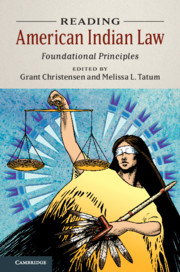Book contents
- Reading American Indian Law
- Reading American Indian Law
- Copyright page
- Dedication
- Contents
- Editors and Contributors
- Preface
- Acknowledgments
- Introduction
- Part I Core Concepts
- Part II Voices
- Part III Property
- 9 Sovereignty and Property
- 10 The Legacy of Allotment
- 11 A Common Law for Our Age of Colonialism: The Judicial Divestiture of Indian Tribal Authority over Nonmembers
- 12 In Defense of Property
- Part IV (Mis)Understandings
- Book part
- References
12 - In Defense of Property
from Part III - Property
Published online by Cambridge University Press: 11 December 2019
- Reading American Indian Law
- Reading American Indian Law
- Copyright page
- Dedication
- Contents
- Editors and Contributors
- Preface
- Acknowledgments
- Introduction
- Part I Core Concepts
- Part II Voices
- Part III Property
- 9 Sovereignty and Property
- 10 The Legacy of Allotment
- 11 A Common Law for Our Age of Colonialism: The Judicial Divestiture of Indian Tribal Authority over Nonmembers
- 12 In Defense of Property
- Part IV (Mis)Understandings
- Book part
- References
Summary
In Defense of Property: begins by cataloging various types of property and the ways in which Indigenous and European conceptions of property differ. It then proceeds to illustrate ways in which those conceptions have been stereotyped, thus leading to mistaken assumptions about the incompatibility of the two approaches. Carpenter, Katyal, and Riley conclude that using the concepts of fiduciary duty and stewardship found in both approaches can supply a foundation for bridging the different conceptions of property.
- Type
- Chapter
- Information
- Reading American Indian LawFoundational Principles, pp. 285 - 306Publisher: Cambridge University PressPrint publication year: 2019

